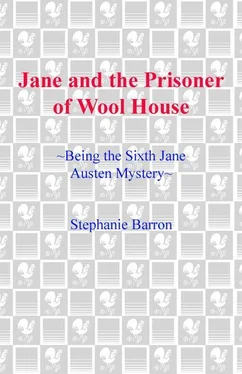Stephanie Barron - Jane and the Prisoner of Wool House
Здесь есть возможность читать онлайн «Stephanie Barron - Jane and the Prisoner of Wool House» весь текст электронной книги совершенно бесплатно (целиком полную версию без сокращений). В некоторых случаях можно слушать аудио, скачать через торрент в формате fb2 и присутствует краткое содержание. Жанр: Исторический детектив, Иронический детектив, на английском языке. Описание произведения, (предисловие) а так же отзывы посетителей доступны на портале библиотеки ЛибКат.
- Название:Jane and the Prisoner of Wool House
- Автор:
- Жанр:
- Год:неизвестен
- ISBN:нет данных
- Рейтинг книги:4 / 5. Голосов: 1
-
Избранное:Добавить в избранное
- Отзывы:
-
Ваша оценка:
- 80
- 1
- 2
- 3
- 4
- 5
Jane and the Prisoner of Wool House: краткое содержание, описание и аннотация
Предлагаем к чтению аннотацию, описание, краткое содержание или предисловие (зависит от того, что написал сам автор книги «Jane and the Prisoner of Wool House»). Если вы не нашли необходимую информацию о книге — напишите в комментариях, мы постараемся отыскать её.
Jane and the Prisoner of Wool House — читать онлайн бесплатно полную книгу (весь текст) целиком
Ниже представлен текст книги, разбитый по страницам. Система сохранения места последней прочитанной страницы, позволяет с удобством читать онлайн бесплатно книгу «Jane and the Prisoner of Wool House», без необходимости каждый раз заново искать на чём Вы остановились. Поставьте закладку, и сможете в любой момент перейти на страницу, на которой закончили чтение.
Интервал:
Закладка:
“We may blame Eustace Chessyre and his uneasy conscience for spoiling such morbid hopes,” said my brother.
“Perhaps we may congratulate ourselves, for having thrown Etienne LaForge into the fray, and complicating matters irremediably,” I added. “We must certainly accept the burden of his poisoning.”
“But how? Louisa Seagrave has never been to Wool House — and on Thursday, when LaForge fell ill, we know her to have been at home!”
“Remember that LaForge was present in Lombard Street on Thursday, in company with ourselves. We were served dry sherry and iced cakes, much against our will. Is it at all possible that Monsieur LaForge was poisoned then, Mr. Hill, and not several hours later?”
“It is possible,” the surgeon said slowly, “for you will recall that LaForge was ill en route up the Solent. Something might have been introduced, I suppose, to his victuals in Lombard Street. We ascribed his sickness to the effects of fever and the sea, but with the benefit of hindsight—”
“The lady would have to be remarkably cool!” Frank protested. “She had only just learned of Seagrave's survival — of LaForge's existence — and you would have the poison so conveniently to hand?”
“She had learned of LaForge's existence a full two days before his appearance in her drawing-room,” I countered. “You told her yourself, Frank — in your express to Seagrave of Tuesday; and we learned from the Captain only this morning that Louisa had plundered his desk.”
That fact must cause my brother to fall silent an instant “But consider, Jane,” he attempted at last, “that we believe Eustace Chessyre to have been murdered by his conspirator. Nothing you may say shall convince me that Louisa Seagrave wields a garrote. It is one thing to plot disgrace, and another entirely to strangle a man!”
“True.” I halted before the hearth and stared into the flames. “But where did Louisa go, when she fled Portsmouth on Wednesday night in her aunt's carriage — a carriage that bore the arms of a baronet? To meet with Chessyre, who she feared repented of his betrayal?”
“If Louisa Seagrave was the veiled woman in the carriage, and not Phoebe Carruthers, then Chessyre was a fool to get in,” said Frank bluntly.
“He may not have feared the hands of a woman. Particularly one who appeared so sickly.”
Mr. Hill nodded once, as though in agreement; but my brother could not be easy.
“Why despatch Chessyre, if his death should suspend the very trial and conviction she desired?”
“Because you outlined the Lieutenant's plot in your express of Tuesday. Louisa is unsteady in her mind, as we have all observed; she may have read that letter, feared Chessyre's exposure of herself and her object — and made her plans accordingly.”
Frank revolved the idea in his mind. It is something to learn that one's meddling for good might have achieved the deaths of two men.
“But why, Jane?” he demanded suddenly. “Do you believe Louisa to crave rank and fortune so very much? She scorned them fifteen years ago.”
“Fifteen years is a period,” I mused. “Louisa has become a bitter woman in the interval, and not a little deranged by opium. And she has much to resent, Frank — the rumours of Seagrave's infidelity, the threat she perceives to her sons' safety. She felt the decline in her social fortunes acutely, I assure you. All these must have led her to Dr. Wharton's Comfort in the end.”
Mr. Hill cleared his throat. “I should say rather that the steady usage of Dr. Wharton's Comfort may have deluded the lady, over time, into believing her husband the very ogre whose face she saw in her nightmares. To kill such a beast — we might take it as Mrs. Seagrave's hidden desire to free herself from opium-eating.”
“You are kinder by half than I should be,” muttered my brother.
There was a knock at the parlour door, and the maidservant's visage once more appeared around the frame. “Begging your pardon, but the lady upstairs is awake, and asking for Miss Austen.”
I glanced at the gentlemen with resolution. “What shall I say to her?”
“For now,” cautioned Mr. Hill, “it is vital to offer comfort.”
Frank held his finger to his lips. “Remember that you know nothing for certain, Jane. Do not betray your worst fears. Remember that we have told her LaForge is dead. She may exult in the idea that her secret is safe. If Louisa intends to have her fortune, she must despatch Seagrave tonight.”
“Then we must watch her every movement,” I cried.
SHE HAD ARISEN BY THE TIME I ENTERED, AND WAS staring at her countenance in the looking glass.
“I was quite beautiful once. You would not think so, Miss Austen, to look at me now — but that summer I made Thomas's acquaintance in Brighton, I was the flower of the regiment,”
“The passage of time may affect many changes, in appearance and sentiment; we are none of us immune.”
“I cannot remember the name of the regiment in Brighton that year,” she murmured, “but it scarcely matters. I tired of scarlet uniforms, and turned instead to blue. Thomas thought me quite the most extraordinary creature he had ever seen.”
“And you?” I asked her quiedy. “What did you think of him?”
Her fingers, which had been fluttering over the wisps of her dull, black hair, stilled an instant; her eyes met mine in the glass. “I thought John Donne had come again to walk the earth. 'When thou and I first one another saw: / All other things, to their destruction draw.' ”
“ 'Only our love hath no decay; / This, no tomorrow hath, nor yesterday,' “ I quoted. “The perfect union of two hearts, two souls, for all eternity. It is a fearful burden to answer, Mrs. Seagrave. A greater man than your husband should have bowed beneath it; for time, as we know, will exact its cost. Death only may preserve such love.”
She shuddered as if with cold, and reached for her bottle of laudanum.
“Mr. Hill is of the opinion that Dr. Wharton's Comfort works viciously upon the system,” I told her gently. “Do you not wish to rid yourself of its effects?”
“At the suggestion of a naval hack?” she enquired with a laugh. “When I choose to consult a doctor regarding my health, Miss Austen, he shall be a reputable London physician — not the sort of man who administers to gaol-fever. I wonder you allow Mr. Hill's acquaintance; he is hardly prepossessing.”
“Take care, Mrs. Seagrave,” I replied evenly. “You would not wish me to prefer one friend to another.”
Her expression hardened instantly. “I am glad you are come today, Miss Austen. I should have regretted quitting Southampton without a word of farewell. I go into Kent tomorrow with my children, for the funeral of my father — Viscount Luxford — and I cannot say when it shall be in my power to meet with you again.”
Had she summoned me upstairs merely to issue this dismissal?
“It is a considerable distance. Do you travel around the coast by boat — or intend to journey overland, by post?”
“My aunt is to send her carriage for me. It would not do, she insists, for the daughter of a viscount to appear at Luxford in one of the Dolphin's equipages.” She turned her face before the glass once more, in contemplation of her complexion. “I shall achieve my ancestral home in good time for the funeral rites. How surprised they shall be to see me at Luxford!”
“Then you shall be in need of your rest, Mrs. Seagrave,” I said curtly, and bade her adieu.
Chapter 26
The Uses of Letter Knives
1 March 1807, cont.
IT WAS EVIDENT THAT LOUISA SEAGRAVE MEANT TO murder her husband under cover of darkness, before quitting Southampton altogether on the morrow. Mr. Hill and my brother were agreed that, having employed poison once, the lady might be likely to attempt it again — with the introduction of some noxious substance in a parting gift of food she would press upon Tom Seagrave at this last interview. We deemed it probable that Louisa should await her children's retiring, before quitting the Dolphin; she should not be likely to attempt any evil before eight o'clock at the earliest. The two gentlemen agreed to take it in turns to watch throughout the night for Louisa's appearance in Gaoler's Alley; as the duty would be a chilly and tiresome one, I was forbidden to appear, and consented most unwillingly to remain at home in East Street.
Читать дальшеИнтервал:
Закладка:
Похожие книги на «Jane and the Prisoner of Wool House»
Представляем Вашему вниманию похожие книги на «Jane and the Prisoner of Wool House» списком для выбора. Мы отобрали схожую по названию и смыслу литературу в надежде предоставить читателям больше вариантов отыскать новые, интересные, ещё непрочитанные произведения.
Обсуждение, отзывы о книге «Jane and the Prisoner of Wool House» и просто собственные мнения читателей. Оставьте ваши комментарии, напишите, что Вы думаете о произведении, его смысле или главных героях. Укажите что конкретно понравилось, а что нет, и почему Вы так считаете.












